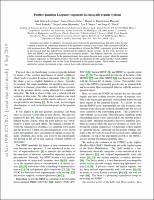Please use this identifier to cite or link to this item:
https://hdl.handle.net/20.500.12202/4843Full metadata record
| DC Field | Value | Language |
|---|---|---|
| dc.contributor.author | Pilatowsky-Cameo, Saúl | |
| dc.contributor.author | Chávez-Carlos, Jorge | |
| dc.contributor.author | Bastarrachea-Magnani, Miguel A. | |
| dc.contributor.author | Stránský, Pavel | |
| dc.contributor.author | Lerma-Hernández, Sergio | |
| dc.contributor.author | Hirsch, Jorge G. | |
| dc.contributor.author | Santos, Lea F. | |
| dc.date.accessioned | 2020-01-07T20:23:14Z | |
| dc.date.available | 2020-01-07T20:23:14Z | |
| dc.date.issued | 2019-09-09 | |
| dc.identifier.citation | Pilatowsky-Cameo, Saúl ; Chávez-Carlos, Jorge ; Bastarrachea-Magnani, Miguel A. ; Stránský, Pavel ; Lerma-Hernández, Sergio ; Santos, Lea F. ; Hirsch, Jorge G. (9 Sep 2019). Positive quantum Lyapunov exponents in classically regular systems. Statistical Mechanics (cond-mat.stat-mech). arXiv.org. arXiv:1909.02578v2. | en_US |
| dc.identifier.uri | https://arxiv.org/pdf/1909.02578.pdf | en_US |
| dc.identifier.uri | https://hdl.handle.net/20.500.12202/4843 | |
| dc.description | Scholarly article (pre-print) | en_US |
| dc.description.abstract | Quantum chaos refers to signatures of classical chaos found in the quantum domain. Recently, it has become common to equate the exponential behavior of the quantum evolution of out-of-time order correlators (OTOCs) with quantum chaos. The quantum-classical correspondence between the OTOC exponential growth and chaos in the classical limit has indeed been corroborated for different chaotic systems. In this work, however, we show that OTOCs can grow exponentially also in regular models. This happens when the classical system exhibits isolated unstable points. In the quantum domain, these points become finite regions, where the quantum Lyapunov exponents are throughout positive. Our results are illustrated for the Lipkin-Meshkov-Glick (LMG) model, which is integrable, and for the Dicke Hamiltonian in the regular regime. These models are currently realized in various experimental setups, such as those with cold atoms and ion traps. | en_US |
| dc.description.sponsorship | We thank Jack Dale for helping us with the proof of Eq. (S4) in the SM [47], and Enrique Palacios, Luciano D´ıaz, and Eduardo Murrieta of the Computation Center - ICN for their support. PS is grateful to P. Cejnar for stimulating discussions. We acknowledge financial support from Mexi-can CONACyT project CB2015-01/255702, DGAPA- UNAM project IN109417. PS is supported by the Charles University Research Center UNCE/SCI/013. LFS is supported by the NSF grant No. DMR-1603418. LFS and JGH thank the hos-pitality of the Aspen Center for Physics | en_US |
| dc.language.iso | en_US | en_US |
| dc.publisher | arXiv.org | en_US |
| dc.relation.ispartofseries | Statistical Mechanics (cond-mat.stat-mech);arXiv:1909.02578v2 | |
| dc.rights | Attribution-NonCommercial-NoDerivs 3.0 United States | * |
| dc.rights.uri | http://creativecommons.org/licenses/by-nc-nd/3.0/us/ | * |
| dc.subject | Statistical Mechanics (cond-mat.stat-mech) | en_US |
| dc.subject | Chaotic Dynamics (nlin.CD) | en_US |
| dc.subject | Quantum Physics (quant-ph) | en_US |
| dc.subject | Positive quantum Lyapunov exponents | en_US |
| dc.subject | chaos | en_US |
| dc.title | Positive quantum Lyapunov exponents in classically regular systems. | en_US |
| dc.type | Article | en_US |
| dc.contributor.orcid | 0000-0001-9400-2709 | |
| local.yu.facultypage | https://www.yu.edu/faculty/pages/santos-lea | |
| Appears in Collections: | Stern College for Women -- Faculty Publications | |
Files in This Item:
| File | Description | Size | Format | |
|---|---|---|---|---|
| Santos positive quantum1909.02578.pdf | arXiv.org | 1.23 MB | Adobe PDF |  View/Open |
This item is licensed under a Creative Commons License

